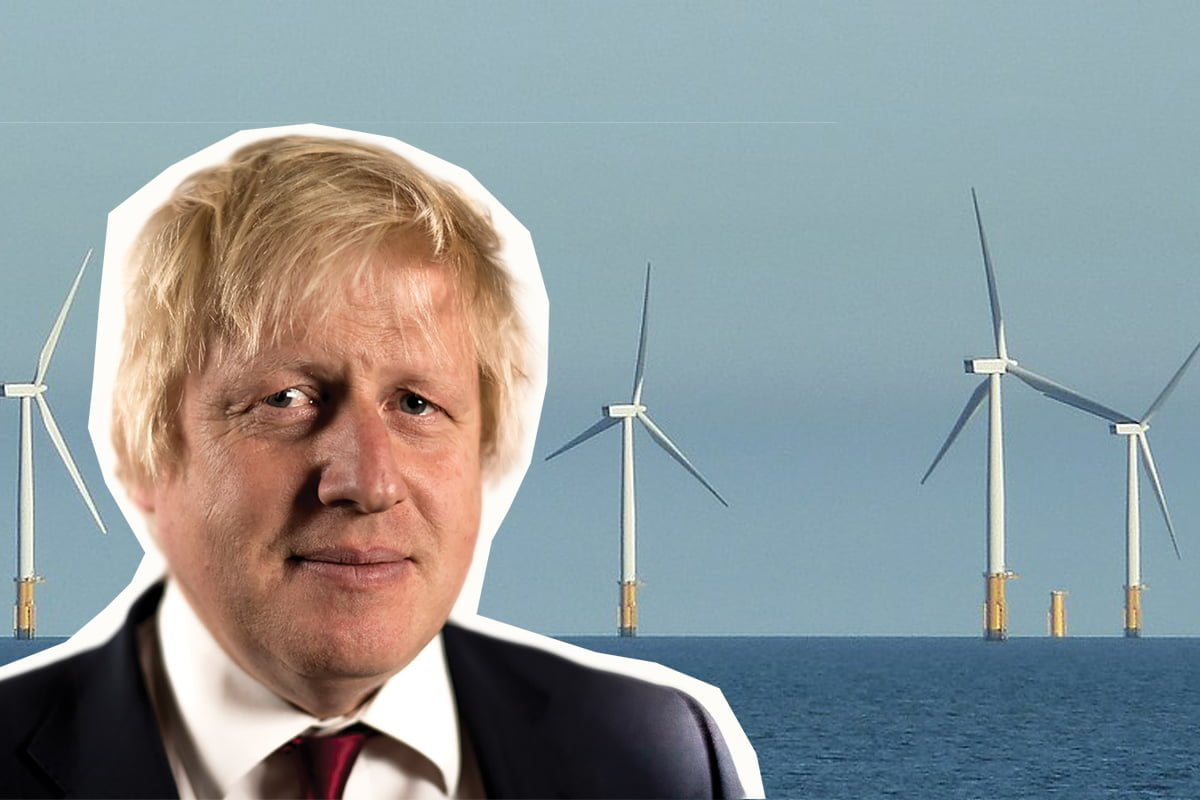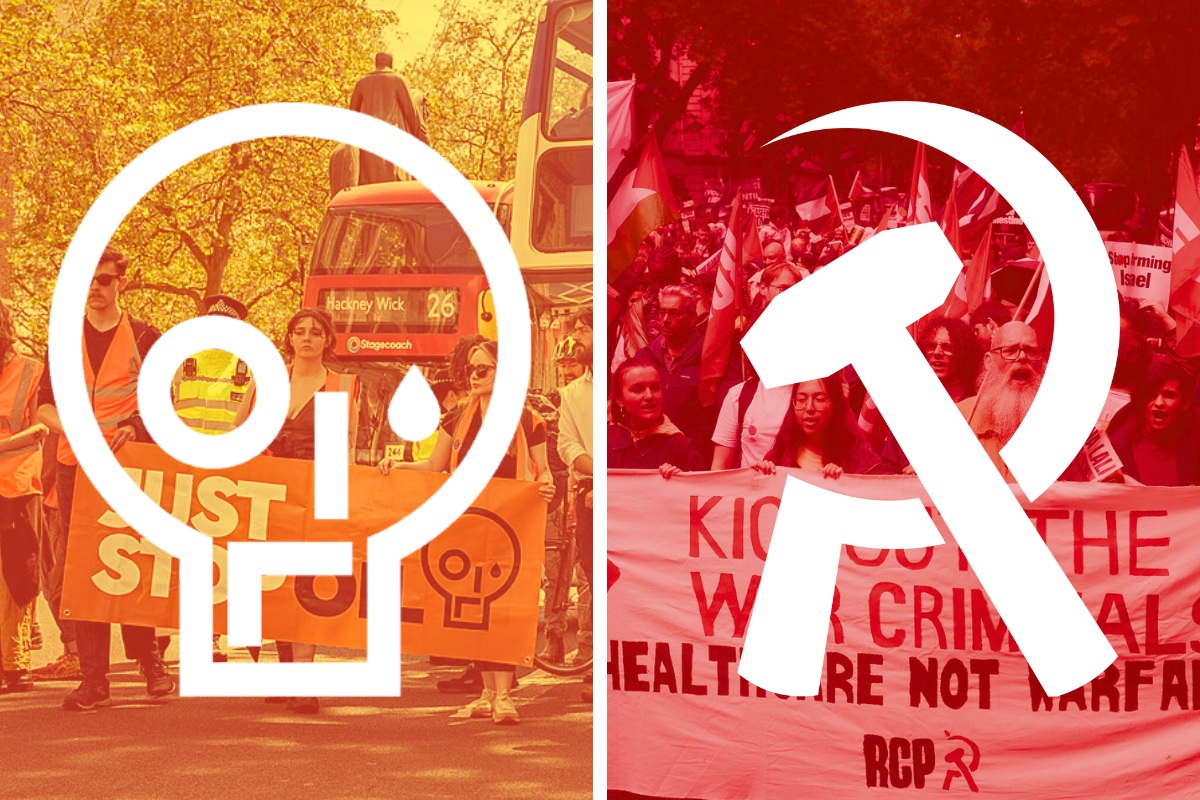With his new environmental strategy, the Tory leader has pledged to save both the planet and the economy. But these are empty promises, relying on big business at a time of deep crisis. We need a socialist response to climate chaos.
Boris Johnson recently released a new 10-point plan for a ‘green industrial revolution’, triumphantly announcing a list of policies to make the country “cleaner, greener and more beautiful”.
Stealing the name from Labour’s 2019 manifesto, the Tories’ new plan promises an injection of £12bn of public money to invest in renewable energy projects, nuclear and hydrogen energy production, carbon capture technology, and infrastructural improvements.
In addition, the proposal commits to a ban on combustion engines by 2030, the introduction of grants for electric cars, and a promise of funding for car charging points.
Shopping list
The Prime Minister’s plan is not only aimed at tackling the climate crisis, but is also meant to form the basis of Britain’s post-COVID economic recovery by creating ‘green’ jobs to tackle rising unemployment. The government promises to use these measures to create 250,000 in the most deprived areas of the UK – in the North, Midlands, Wales and Scotland.
This plan therefore represents a key pillar of the Tories’ programme going forward, through which they intend to spur on the economy and carry through their ‘levelling-up’ agenda.
Johnson boldly claims that this proposal “will turn the UK into the world’s number one centre for green technology and finance, creating the foundations for decades of economic growth.”
But this absurdly hyperbolic statement comes at a time when we are facing a deep and prolonged economic crisis, with the prospect of mass unemployment. Already, workers are struggling to get by and increasing numbers are forced to rely on food banks. And this is only the beginning.
This latest announcement is therefore nothing but more bluff and bluster from the PM, designed to distract from the Tory government’s ineptitude in dealing with the current crisis.
Look beneath the surface of these latest proposals, and it is clear that they are nothing but empty promises. As Green MP Caroline Lucas correctly stated: “This is a shopping list, not a plan to address the climate emergency.”
“We don’t have the ambition that’s necessary for this moment.”
The Green Party MP, @CarolineLucas says there isn’t “enough boldness” in the govt’s 10-point plan to tackle #climatechange .#KayBurley
Get more on this story: https://t.co/upn2FRZJuH pic.twitter.com/wazSpxLm0F— Sky News (@SkyNews) November 18, 2020
Speculative solutions
A large part of the scheme includes a major investment into nuclear and hydrogen power, along with carbon capture and storage (CCS). Over £1bn of public money has been earmarked for this purpose.
£525 million will be invested in new sources of nuclear power called small modular reactors (SMRs). These are intended to make nuclear power cheaper by doing away with enormous power plants. Instead, much smaller, factory-built power stations will be introduced. These can be transported by road, and can be assembled quickly and at a lower cost. Rolls-Royce is one of the companies bidding for public funding to advance this project.
This technology is still in its early stages of development, however, and there are big questions as to whether it will be able to compete with renewable energy. As Paul Dorfman, a researcher at University College London, explained:
“Given the ongoing steep reduction in all renewable energy costs, and since SMR research and development is still very much ongoing, by the time SMRs comes to market, can they ever be cost competitive with renewable energy? The simple answer to that is a resounding no.”
Hydrogen power and CCS meanwhile, go hand-in-hand. Hydrogen can be most cheaply extracted from the burning of fossil fuels. Meanwhile, carbon capture acts to trap carbon emissions and store them underground.
The idea is that it is cheaper to keep running fossil plants – and minimise emissions through carbon capture – than to do away with them and fully transition to renewables. Again, however, both of these technologies are in their early stages and have not been widely rolled out.
Previous attempts by the UK government to invest in carbon capture ended in humiliation when the project was scrapped due to cuts. In 2015, a £1bn competition to demonstrate CCS could be viable on a commercial scale was scrapped just six months before it was due to end – and just days before the Paris climate change summit.
Ultimately, all of these technologies are risky. They will take time to be developed and will require substantial investment to make them viable. And it is clear that the Tories will be relying on the private sector to provide the lion’s share of this investment. As the head of politics for Greenpeace UK, Rebecca Newson, explains:
“It’s a shame the Prime Minister remains fixated on other speculative solutions, such as nuclear and hydrogen from fossil fuels, that will not be taking us to zero emissions anytime soon, if ever.”
Offshore wind
 Another central part of the government’s plan is the expansion of offshore wind power across the UK, with an ambitious aim to quadruple the offshore wind capacity from 10GW to 40GW by 2030.
Another central part of the government’s plan is the expansion of offshore wind power across the UK, with an ambitious aim to quadruple the offshore wind capacity from 10GW to 40GW by 2030.
At this year’s Conservative Party conference, Johnson emphasised the potential of Britain’s offshore wind industry. The Tory leader stated that: “I remember how some people used to sneer at wind power 20 years ago and say that it wouldn’t pull the skin off a rice pudding” – a phrase which he himself used to describe the technology in 2013.
Research by Aurora Energy Research suggests that meeting this target would require the installment of 260 new turbines per year for five years. This is no small undertaking. The government, meanwhile, estimates that it will cost £1.5bn per 1GW increase in capacity. This means that meeting the target of 40GW by 2030 will cost an enormous £45bn, of which the government is only investing £160 million.
So where is the money coming from? Again, the government is overwhelmingly (and optimistically) relying on the private sector. Over the last decade the private sector has invested an estimated £24bn into offshore wind in the UK. This means the investment of the last decade will have to be almost doubled in order to meet the government’s target.
Hot air
Herein lies the problem: Johnson’s plan relies almost entirely on investment from big business – just at a time when UK (and world) capitalism is entering into its deepest ever crisis.
The perspective for the global economy is not one of boom and thriving investment, but one of slump, stagnation and uncertainty. The UK will be hit particularly hard by the dual shocks of COVID-19 and Brexit.
The Prime Minister is promising not only that investment will be forthcoming, but that this will also be the foundation of Britain’s economic recovery. This is nothing but hot air. One cannot wish a boom into existence under capitalism.
Capitalism is a system based on production for profit; an economy operating not according to social needs, but according to the laws of competition and the market. If the capitalists do not anticipate a decent return on their money, then they will not invest – including in technologies to tackle the climate crisis.
At the end of the day, the problem is reduced to a class question – a question of ownership. Creating a green and sustainable economy clearly requires planning, in order to direct resources and funds for research and investment. But you cannot plan what you don’t control; and you don’t control. It is as simple as that.
Planning production
 Both the technologies and the money needed to solve the climate crisis exist. But it is the capitalist system that prevents these from being deployed to fight this looming catastrophe.
Both the technologies and the money needed to solve the climate crisis exist. But it is the capitalist system that prevents these from being deployed to fight this looming catastrophe.
The fundamental problem is that the needs of the market are in contradiction with the needs of society.
It is the capitalists’ insatiable thirst for profits that is responsible for destroying the environment and polluting the planet. And it is this same profit-motive which means that green technologies that have existed for decades have lacked proper investment, and still lack it today.
The money exists to invest in revolutionising production, transforming society, and creating a sustainable economy. But this wealth – obtained from the labour of the working class and from nature – is sitting idle in the bank accounts of the bosses, the billionaires, and big business.
Only by expropriating this wealth, therefore, and consciously planning production through public ownership and workers’ control, can we meet the needs of society as a whole and tackle the climate crisis.
In the 1970s, workers at Lucas Aerospace showed that this is possible. When the arms manufacturer was closing down operations and preparing redundancies, organised workers created the ‘Lucas Plan’ – an alternative plan of production.
This utilised workers’ technical knowledge to propose a range of socially-useful products that the company could produce, from kidney dialysis machines to renewable energy solutions.
Now is the time to bring back the ethos of the Lucas Plan: to give workers control over production, and to plan the economy along socialist lines – in the interest of people and the planet, and not profit.





